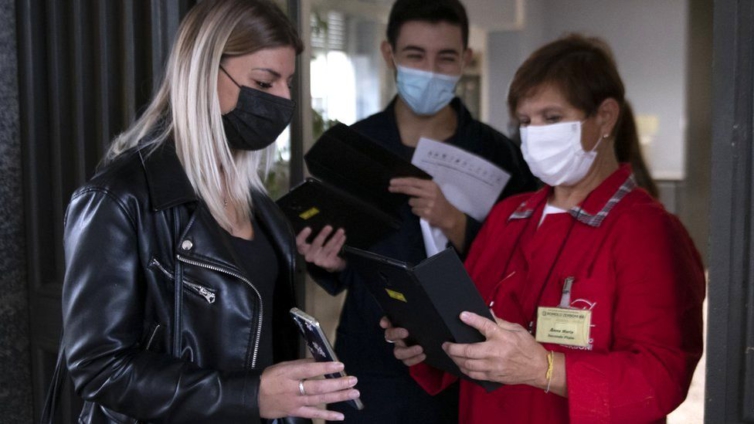Italy is to make it compulsory for all workers to have a Covid "green pass" - proof of vaccination, a negative test or recovery from the virus.
The measures are a first for Europe and some of the strictest in the world.
Anyone without a pass will reportedly face suspension from work and may have their pay stopped after five days.
The measure, due to come into force on 15 October, aims to boost vaccinations in a country that has been badly hit by the virus.
Green pass certificates for Covid-19, provided both digitally and on paper, are already required to access Italian train stations, cinemas, restaurants, gyms and swimming pools.
School staff are also required to show a pass and some teachers have reportedly been turned away from work.
On Thursday, the Italian government approved a new law to extend the requirements to all workplaces and employees across all sectors, including the self-employed.
Businesses and staff could face fines of up to €1,500 (£1,280) if people are found to be working without a valid green pass.
Announcing the decision, Health Minister Roberto Speranza said the new measures would improve safety and "make our vaccination campaign even stronger".
"The implementation of a pass such as the one we are bringing into force with this decree will, we are certain, help us push forward this vaccination campaign," he said.
Despite a vocal anti-vaccination minority, Italians have broadly backed the government's vaccination campaign.
Nearly 65% of Italians have now been fully vaccinated, but infections have been rising, driven by the Delta variant.
Italy has recorded more than 4.6 million cases of Covid-19 and over 130,000 coronavirus-related deaths since the start of the pandemic, according to Johns Hopkins University data.
The green pass was initially introduced to make travel within the EU more efficient, and several countries have since introduced requirements for people to show the certificate for different reasons.
France requires a health pass for access to restaurants, bars, planes and trains, while Austria and Cyprus are among other EU countries to have used similar schemes.
Latest Stories
-
Dumsor Levy: A necessary intervention for Ghana’s energy future
4 minutes -
GPRTU threatens nationwide strike over new GH¢1 fuel levy
7 minutes -
High Inflows from raw natural resources — where is it all leading Ghana, Our Beloved Country?
9 minutes -
DR Congo bans reporting on ex-President Kabila
24 minutes -
We remain policy solvent despite recording GH¢9.49bn Operating Loss in 2024 – BoG
26 minutes -
Dr. Abubakari Sidick Ahmed to be honoured with grand retirement celebration
27 minutes -
Galamsey: Illegal fuel supply point uncovered in forest reserve; Chinese nationals arrested
29 minutes -
Mahama launches ‘One Tree per Child’ initiative to combat environmental degradation
34 minutes -
Endurance Grand calls out the TGMAs for not recognising dancers in Ghana
38 minutes -
Ofori-Atta is major reason for current economic stability – Dr. Domfe
42 minutes -
Mahama strikes gold: Bank of Ghana reserves soar by 1.54 tonnes in five months
44 minutes -
‘Takeaway packs’ to be banned soon – Mahama reveals
49 minutes -
What Is Agentic AI, and how will it change Fintech?
1 hour -
Celebrating the future of STEM: African Science Academy’s 2025 graduation set for June 9
1 hour -
Ecobank and ADB executives pay business calls on GCAA
1 hour

